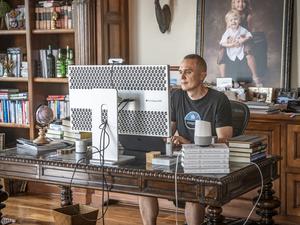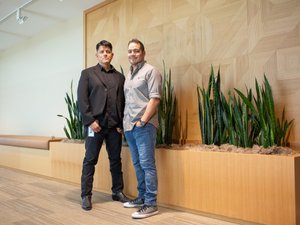
It's often said that timing is everything when it comes to startup success. The pandemic has made that adage clearer than ever, and perhaps nowhere does that sense of timing come into more focus than at a university where fresh ideas are prepped for the real world.
Each year, the University of Texas' Student Entrepreneur Acceleration and Launch -- or SEAL -- program selects startups from across the 40-plus entrepreneurship programs at UT Austin and the Texas Blackstone LaunchPad network at UT Dallas and Texas A&M.
The program provides mentorship, resources and then helps the founders make a go or no-go decision. The program has been working with startups for 12 years, and alumni, including Favor, M87 and many others, have gone on to raise millions in venture capital -- and several have been acquired in blockbuster deals.
This year's class has faced challenges unlike any other. And that promises to make this year's Decision Day event on July 30, where companies present their ideas and announce their go or no-go decision, even more intriguing.
"They always say being a solo founder is a sobering experience, but I never quite believed it fully until recently," one founder told us.
Ahead of the event, Inno conducted a Q&A over e-mail with the SEAL program startups to learn more about why they launched their companies and the challenges they've faced in building runway since the program began. See responses from several of the founders below, along with company descriptions and links provided by SEAL.
Organic, local produce delivery fighting food insecurity.
Inno: What inspired you to launch a startup?
Zack Timmons, co-founder and CEO: "I'm a fourth year medical student, and I believe no matter the zip code, everyone deserves convenient access to healthy food. I started Good Apple to address two core problems in our food system-- food waste and food inequality. We partner with local farmers to rescue produce that would otherwise go unsold. We then operate a subscription-based produce delivery service for our paying customers. Finally, through partnerships with food pantries, for every box we sell, we deliver another box of healthy food directly to the doors of families facing food insecurity. We help farmers increase their revenues, provide convenient access to local food for customers, and increase food access for our clients-- it's a win-win-win."
Inno: What is one of the biggest adjustments or challenges your startup has made since entering the SEAL program?
Timmons: "Our team was fortunate to have some early traction, and through the guidance of our SEAL mentors, we've been able to narrow our focus and energy to a few key factors to begin to scale our business. We've strategically streamlined much of our operational burden, and now, we're focused on growth, which is an exciting place to be."
NwaBebé
We created a baby bottle system that enhances the infant feeding experience, both cognitively and emotionally, while allowing other caretakers to participate.
Inno: What inspired you to launch a startup?
Dara Chike-Obi, CEO and co-founder: "We wanted to refocus the parenthood journey to embrace today’s modern families and our lifestyles. My co-founder and I became mothers during demanding periods of our professional lives. Like most parents, we relied heavily on a network of trusted family and friends to help us juggle our personal and professional obligations. It was then when we noticed a lack of baby products that encouraged the participation of others during critical early stage development. We wanted to change that by leveraging the latest child development research into commonly used baby products. Our goal is to maximize and advance ALL caretakers’ engagement with the child from the very beginning."
Inno: What is one of the biggest adjustments or challenges your startup has made since entering the SEAL program?
Chicke-Obi: "SEAL forced us to focus on our messaging and overall market. We (co-founders) are the target persona and it can be easy to assume we were equipped with enough insight. However, our time in this program allowed us to slow down and conduct even more thorough testing. As a result we’re walking away with an even deeper understanding of our market’s nuances and an even clearer way to communicate and apply them."
Developing the world's first semi-permanent tattoo inks.
Inno: What inspired you to launch a startup?
Matt Miller, founder and CEO: "Like a lot of people, I grew up wanting to do something that would actually make a positive difference in the world. I didn't want to be another desk jockey (does anyone really?). That was a large part of why I chose to pursue engineering. But the deeper I got into academia, the more disappointed I was with the rate of progress. Even though I was working on research that could potentially benefit millions of people, the commercialization process is so drawn out and the incentives are so misaligned that I knew it would likely be decades before anything tangible resulted from my work, if ever. On the flip side, most of the radical change of the last few decades was born from startups who ignored the status quo. And with some exceptions, startups have been an extremely positive influence on our lives. I wanted to be a part of that radical change, and I decided that founding Oxymoron Ink was an excellent way of putting to use the skills I've developed so far in a way that can positively impact a huge number of people."
Inno: What is one of the biggest adjustments or challenges your startup has made since entering the SEAL program?
Miller: "For me, one of the biggest challenges so far has been juggling trying to finish my thesis research so I can graduate this Fall while simultaneously trying to start a company. As a solo founder, it's been an eye-opening experience. Early on, things were going pretty smoothly, and I even managed to win first place in the Texas Venture Labs Investment Competition in May, which was a great experience and great validation. As things have developed since then, I've realized I really don't want to go at this alone long-term. They always say being a solo founder is a sobering experience, but I never quite believed it fully until recently. So with that said, I'm currently looking for the right co-founder, which in large part was decided after all the work I've done through SEAL and the NSF I-Corps program this summer."
Humanitarian company removing economic barriers in organizations by integrating charitable giving with consumer spending.
Inno: What inspired you to launch a startup?
Ryan Murphy, president: "The inspiration to launch Sapien stemmed from a desire to help others in need. As Boy Scouts, our team observed a massive decline in participation within Scouting during the economic crisis of 2008 simply because extracurriculars came second to putting food on the table or taking care of the family. With Sapien, our objective is to separate a family's financial status from the criteria that determine whether children are eligible to participate in extracurriculars. By providing a seamless and turnkey fundraising solution, we establish financial independence for youth and for organizations, thereby allowing children to pursue the opportunities of their choice. Ultimately, we recognize the significant role extracurriculars play in the development of our youth and want to enable children to seek the exposure necessary to discover their passions, build character, and follow a pathway to higher values."
Inno: What is one of the biggest adjustments or challenges your startup has made since entering the SEAL program?
Murphy: "The most significant challenge Sapien has faced throughout our time in the SEAL program has been overcoming COVID-19 related complications. Since the beginning of the global pandemic, we've been developing contingency plans for our supply chain, investing additional resources in our ecommerce infrastructure, and expanding the scope of our services to maintain a sustainable competitive advantage amidst the COVID-19 environment. Additionally, SEAL has helped us to refine our focus and pursue organizations that intend to actively utilize our platform, thus creating value for Sapien and aiding us in our effort to garner market share."
Terra Helmets
Eco-friendly company committed to designing helmets for various industries ranging from e-scooters to construction.
Inno: What inspired you to launch a startup?
Collin McCloskey: "As students at UT Austin, we frequently use electric scooters to get around campus. We know peers who have been severely injured because they did not have a helmet on while riding one of these scooters. By creating a helmet, we hope to reduce the number of injuries related to electric scooter incidents."
Inno: What is one of the biggest adjustments or challenges your startup has made since entering the SEAL program?
McCloskey: "All three of us are engineering students at UT, so before coming in to SEAL, we were mainly focused on the design and safety attributes of our helmet. As we progressed through the program, we learned that a lot more goes into a business besides the design of the actual product. Since entering SEAL, we have had to change the way we approach our business by adjusting to look at all of the aspects that are necessary for a startup, including market validation, operations and manufacturing, and our go-to-market strategy."
BioBQ
Patented technology for the generation of aligned muscle and fat cell sheets that can be stacked to form three-dimensional, layered meat.
Trip planning, booking and social collaboration for military trips.
We make continuing education easy for real estate professionals.
Giga Energy
We reduce flare emissions via on-site natural gas powered data-centers.
Virtual reality powered skills-based training platform Activated carbon cloth shoe bag that filters rock climbing shoe odor.
Odopac
No information provided.
Pocket Punch Pocket Punch is a hand-held multifunctional self-defense device created by female UT students to empower individuals to protect themselves.
Learn more about Pocket Punch in our recent profile story.







